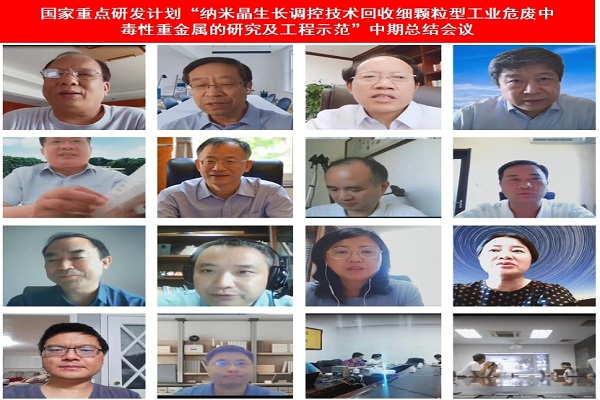

On August 6th, 2021, the mid-term summary meeting of the national key R&D plan research and engineering demonstration of recovering toxic heavy metals from fine-grained industrial hazardous wastes by nanocrystalline growth control technology led by South China University of Technology was held in the form both online and offline. Academician Hong Maochun, Zhao Jincai, and Chai Liyuan, and Professor He Dannong, Mai Liqiang, Mao Lanqun, Dang Zhi, Zhang Xiaobing, Wang Pingshan, Wang Ruihu and Sun Yifei were invited as experts, which was co-chaired by Professor He Dannong and Professor Mai Liqiang. Professor Lin Zhang, the project leader, and more than 30 research core members of various research topics attended the meeting.

At the beginning of the meeting, Professor Lin Zhang, the chief scientist of the project, expressed a warm welcome and sincere gratitude to the participating experts. Then, Professor He Dannong spoke as the responsible expert and the leader of the expert group.
At the meeting, Professor Lin Zhang introduced the overall situation of the project, and elaborated in detail from the multiple aspects of project background and objectives, key issues, medium-term implementation, outstanding progress, important project management measures and working plan for the next stage. Afterwards, the project team has four topics: topic I micro / nano-phase microstructure of occurrence and coexistence of heavy metals in fine-grained hazardous wastes by researcher Che Yanke of Institute of Chemistry, Chinese Academy of Sciences; topic II research on surface interface regulation of non-equilibrium growth mechanism of typical nanocrystals in hazardous wastes by researcher Luo Junhua of Fujian Institute of Research on the Structure of Matter, Chinese Academy of Sciences; topic 3 chemical equilibrium state of heavy metals in hazardous wastes and regulation law of interfacial separation” by Professor Lin Zhang, and topic 4 rapid growth of nanocrystals and selective separation technology and application demonstration of heavy metals” by Wang Chengjun, general manager of Inner Mongolia Lantai Industrial Co., Ltd. Professor Lin Zhang and manager Wang Chengjun delivered reports on the progress. Based on the full exchange and summary of various topics within early period, the project leaders have completed the writing and summary of the corresponding implementation reports, made a detailed report on the implementation and important research progress at the mid-term summary meeting, and fully discussed with the expert group.
The participating experts spoke highly of the progress of the project and believed that the project team had conducted systematic and in-depth research according to the research plan and completed the expected tasks in terms of project progress, scientific research achievements and talent training. During the implementation of the project, the project has published 36 relevant papers in high-level journals including Angewandte Chemie International Edition, advanced science, Joule, ACS sensor and environmental science and technology, applied for / authorized 14 / 5 national invention patents and 3 / 3 utility model patents, and successfully completed all scheduled medium-term indicators. It is worth mentioning that during the implementation of the project, the project team also won one first prize of invention in 2020 China Nonferrous Metal Industry Science and Technology Award and one second prize of Fujian Provincial Natural Science Award; It was approved as Guangdong Key Laboratory of solid waste pollution control and recycling; Two high-level talents were approved.
The experts also gave clear guidance and suggestions on the next work direction and key points of the project from the aspects of topic relevance, exploration of basic scientific problems and key technology research. The experts encouraged the project team to continue to maintain a good momentum, be brave in innovation and build an international advanced research team on environmental nanotechnology and solid waste disposal. Finally, the participating experts wish the project team can successfully pass the mid-term review of the project by the Ministry of Science and Technology.




